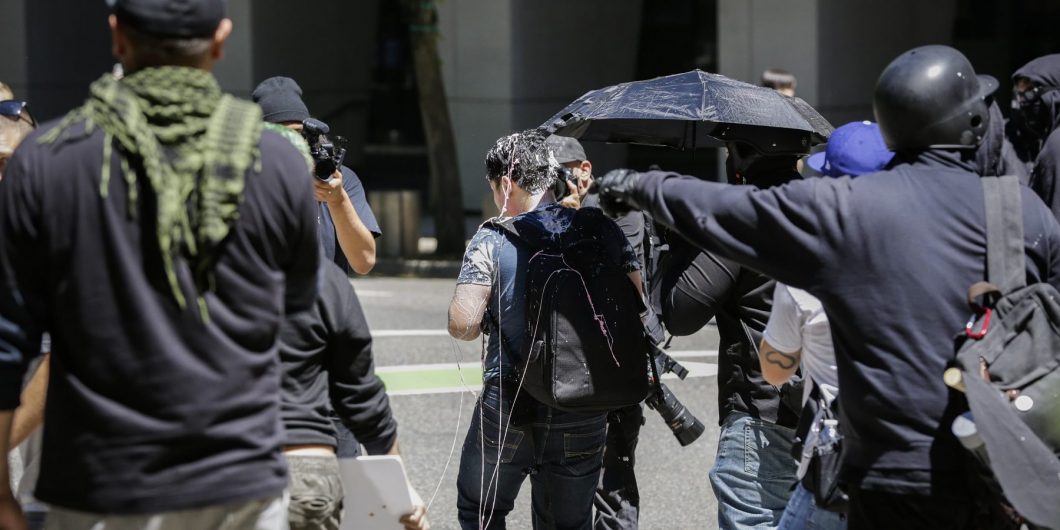Originalism is not merely a modern movement born in 1982; it is as old as the Constitution.
Violence for Thee But Not for Me
Polarization and extreme division are the norm in today’s weak attempts at communication between people. The domestic rise of various violent groups is a symptom of ideology taking precedence over authentic and rational thought. A recent example of this rather disturbing trend was the attack on the journalist Andy Ngo. Ngo was reporting from Portland, Oregon on a series of protests and counter-protests in the city when he was accosted and attacked by a far-left group, Antifa (which has been responsible for many acts of violence at other events). Ngo sustained injuries to the head, which landed him in a hospital.
The violence against Ngo is obviously disgusting and immoral, but what made the situation worse were reactions by various members of the media (primarily from the left) who made excuses for the attack. Ngo had it coming, sang the chorus. Using euphemisms, the media stripped Ngo of his journalist status and cruelly reduced him to an aimless provocateur. To make matters even more chaotic, they added the requisite descriptor “conservative,” which has falsely become synonymous with hatred, racism, and various forms of phobia. Following this logic, violence against Ngo was completely justified—or could at least be tolerated—because he is allegedly a “bad man.”
Refusing to admit the injustice of what happened to Ngo was itself immoral, as was employing various qualifiers in order to make politically palatable the reality of the attack. The Ngo situation reveals that in modern American political life, factional ideology trumps fact. In other words, if a representative of “my” group is wronged, then I will defend that person. But if anyone from the “opposition” is attacked, then I will either remain silent, or worse, sit back and enjoy the show. After all, that is an added point for “our” side, as if all of this was just another game.
But there is much more at stake. Apart from the most obvious point that a violent attack on another human being is immoral, there is another aspect of this social problem. Ngo was sacrificed at the nihilistic altar of ideology. Ideology reinforces various forms of collectivism, which further annihilate the uniqueness and dignity of an individual.
It is impossible to discuss every aspect of human dignity in this case, but it’s important to distinguish some of its features and principles. In Person and Community, Karol Wojtyła argues that “Intellect and freedom are essential and irrevocable properties of the person. Herein also lies the whole natural basis of the dignity of the person.” Human beings are possessors of their wills. Taking away freedom of thought and action is one of the steps of dehumanization. Wojtyła also correctly asserts that acknowledging human dignity
means to place people higher than anything derived from them in the visible world . . . Human beings do not live for the sake of technology, civilization, or even culture; they live by means of these things, always preserving their own purpose. This purpose is intimately connected with truth, because the human being is a rational being, and also with the good, because the good is the proper object of free will.
Thus, ideology is the antithesis of human dignity. The role of any ideologue is to first, demolish the connection between free will and human being, and second, to replace the free thought and action with compliance. When the work of ideological conversion has been exhausted, then the only option that remains on the table is violence because the needs of ideology must be met at any cost. In the case of Andy Ngo, the media members who found Antifa’s behavior excusable, engaged in the inversion of reality in order to keep their ideology alive.
The very ideologues who claim that we need to be kind to one another are not inclined to be kind to their political opponents—for with them, compassion is merely rhetorical. They only extend it to those who completely conform to a particular ideological position, but even in those cases, their offer of compassion is as transient as the specific tenets of their creeds, which shift in response to the needs of the movement. The moment an individual is not useful in the perpetuation of today’s ideology, then he or she is just as easily discarded and tossed onto the curb.
An ideological mind doesn’t care about the entirety and the depth of the human person since the primary objective of ideology is to reduce a person to a malleable construct. This means that any ideology is not concerned with human being’s place in a history and beyond particularities of culture and society, but rather, as Hannah Arendt observes in The Origins of Totalitarianism, man is “thrown into and caught in the process of nature or history for the sake of its movement.” Arendt also correctly observes that ideologies are “historical, concerned with becoming and perishing, with the rise and fall of cultures, even if they try to explain history by some ‘law of nature.’” In other words, the end always justifies the means, which in this case is the propagation of ideology. This is the ultimate denial of moral reality, which begets more denial—specifically of political evil.
We live in not merely strange but violent times—not just threatening to those who cover Antifa, but more importantly, violent to the souls of all those subjected to this new wave of ideological rhetoric. The violent protests and attacks are only a symptom, and much of the problem is directly connected to the current Weltanschauung, which paradoxically has no solid meaning at all. Currently, the ideological society thrives off the notion of fluidity. Permanent definitions, as well as perennial human questions are set aside as unimportant and quaint. The imposition of the doctrine of fluidity on the order of things takes various forms: gender, lack of national borders, and most notably, it finds its comfortable home in globalism. As a result, chaos seems to reign supreme. Since everything is completely changeable and infinitely fluid, the solid markers of the Good, the Beautiful, and the True are covered with the dust of violence, buried deeply into the ever-shifting sand dunes.
At present, we face two difficult tasks: 1) asserting the significance of metaphysics in a world that thrives on fluidity; and 2) affirming perennial principles. This hierarchy of thought may seem disconnected from our current problems, but in order to capture and analyze a subculture of ideology (such as Antifa, for example), we have to be coming from a solid philosophical position.
Metaphysics is of course a large philosophical category, but one need not be an academic or a philosopher to understand the importance of Being. To be is to act in possession of one’s free will, thoughts, memories, and interiority. Since the inverted society represents fluidity coupled with aggression, it follows logically that its proponents choose to dehumanize other people . This means that they participate in a denial of being. After all, if “being human” is subject to progressive logic of fluidity, then it is philosophically easier to remove someone from the category of “human” and instead place them in the category of “enemy.”
When a person is dehumanized, they are in effect told that they don’t exist. This means that not only is their metaphysical reality denied but also their political voice. To be dehumanized is to be fully disconnected from the rest of the people, and thus, the dehumanized subject can quickly become an object or a mere construct. He then proceeds to become alienated from the community, and even the mere possibility of becoming part of a community. This shouldn’t come as a surprise since this is ideology’s main purpose.
We can see how the second task—the affirmation of perennial principles—is even more difficult because the basis of society (Being) is either neglected, denied, or at best relegated to a back corner. Consequently, for those of us who have even a small amount of hope, the only way to rescue society from the clutches of ideological inversions is to single out human ideas that connect all of us. Russell Kirk called these “permanent things.”
In The Conservative Mind, Kirk rightly asserts that “political problems, at bottom, are religious and moral problems.” We simply can’t fix politics with a stronger or more radical form of politics, and until we begin to deal with strange social changes from a philosophical perspective, no amount of transient commentary will help. The cycle of protests and counter-protests is set on repeat mode, and once another protest arises (and/or another unfortunate attack on another human being), it will elicit reactions that will maintain the same level of violent mimicry that we’ve witnessed before. This is the present and the future of American political discourse unless we stop reacting to these twisted changes and steer the conversation in another, more principled direction. Ideology masquerades as truth and in order to change the path of discourse at least, we have to reclaim truth and reality from ideology.
I have said that these are two difficult tasks, and I maintain that point. They are difficult because it is intellectually and spiritually exhausting to assert one voice of reason in the midst of the madness of others. How do we speak about truth and dignity to those that deny the very existence of such concepts and realities? To assert the dignity of another human being, as well as of perennial principles, can make one weary, especially in light of Ecclesiastes’ reminder that “All is mere breath. What gain is there for man in all his toil that he toils under the sun.” And yet, amidst all our toil, we are paradoxically reminded by the author(s) of Qohelet that the inevitability of death also brings a sense of purpose and mission. And so, despite our occasional weariness, we continue to not only search for wisdom but most importantly, to find and point to those markers that are hidden and to brush the sand off their weathered stones.


